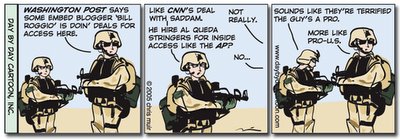
"We must be ready to dare all for our country. For history does not long entrust the care of freedom to the weak or the timid. We must acquire proficiency in defense and display stamina in purpose." - President Eisenhower, First Inaugural Address
Saturday, December 31, 2005
Friday, December 30, 2005
Surprise, surprise: Spy agency runs covert operations
What next? Firemen use water to put out fires? Read the all-too-obvious silliness concerning the use of covert operations by the CIA to track down bad guys here.
My personal guess is that the Washington Post is hoping that the government will stop the covert ops and just limit itself to running classified ads in the Post. You know, like:
My personal guess is that the Washington Post is hoping that the government will stop the covert ops and just limit itself to running classified ads in the Post. You know, like:
"Osama, we are missing you. Please call us on the satellite phone. GPS info appreciated. Love, DOD and NSA"
Somali troubles as seen by the UN
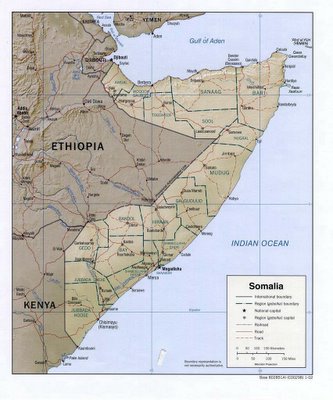
The UN RelieWeb site posts this "special report" on the problems being caused by the pirates of the Somali coast:
Over one million people are food insecure in Somalia. Over 600,000 of these people are currently facing severe food shortages in southern Somali. Piracy is chocking the maritime supply of basic commodities because private commercial vessels are unwilling to risk sailing in Somali waters. Food imports have been especially affected at a time when they are most needed to off-set poor and failed production in 2005. At the same time humanitarian organizations are intensifying their interventions to mitigate the extreme food insecurity created by conflict, crop losses, high cereal prices and insufficient income-earning opportunities. But these critical interventions are being slowed down by piracy.This probably can all be read as "Hey, US, send some ships and Marines to clean up this mess."
Although livestock has traditionally been Somalia's predominant industry, the livestock export ban between 1998 and 2004 has reduced its importance pushing more people to rely on the ocean for their livelihoods. The looming possibility of a ban being placed on international vessels sailing in Somali waters by the IMB, would have a serious impact on the livelihoods and thus the food security of the country, similar to the impact of the livestock ban.
Although the Transitional Federal Government of Somalia has made an effort to improve the situation by contracting the Topcoat (sic-Topcat) Marine Security, piracy remains rife. If action to contain the piracy problem is not successful, the coastline could be declared a war zone resulting in a ban on international marine transport. This would have profound consequences for vulnerable populations who would find themselves subject to even higher basic commodity prices and be stripped further of income-earning opportunities. Furthermore, humanitarian organizations would face even greater challenges in accessing and providing assistance to these populations.
UPDATE 12/31/05: Strategy Page also hears the UN calling for help.
Thursday, December 29, 2005
Training Iraqi Logisticians
Want to ease the exit from Iraq? Then help train the logisticians, as reported here:
It doesn't matter how many troops you have or how well trained they are if you can't sustain them.As the old axiom goes, "Amateurs study tactics; professionals study logistics."- see here. An army that can sustain itself in the field is not limited in the areas it can patrol and in which it can operate.
Coalition logisticians are working with the nascent Iraqi army to build a logistics capability for the force.
Army Lt. Col. Steven Shapiro, chief of operations for 3rd Corps Support Command and selected for promotion to colonel, said the command's soldiers are training Iraqis through schools and, mostly, through on-the-job experience. "We're training the Iraqis to follow up and provide support to their forces as they engage the enemy," Shapiro said during an interview in Balad.
On paper, and increasingly in reality, Iraqi logistical units are embedded in Iraqi maneuver units. The 3rd Corps Support Command is partnered with Iraqi motorized transportation regiments. "When you see an Iraqi army unit engaged, ... their physical resupply is through their motorized transportation regiments," he said.
Plans call for one motorized regiment per division, and the Iraqis plan for nine divisions. The regiments will handle all their own maintenance and their own security. "When we operate on the roads, we protect the convoys," Shapiro said. "The motorized transportation regiments will have their own mobile force protection assets embedded with them."
Three regiments are operating now. Coalition logistics personnel handle supplying the rest of the Iraqi force, Shapiro said.
Wednesday, December 28, 2005
Nigerian Chief of Naval Staff worries about pirates and crude oil thieves

Noted here:
The menace of pirates, crude oil thieves and sea robbers in the oil producing, area of Niger Delta were the major issues discussed when the Navy authority deployed its fleet last week on patrol of the Gulf of Guinea to test the ability of its officers on the war against these threats.According to this,
The officers who were led to the battle zone by the Chief of Naval Staff (CNS), Vice Admiral Ganiyu Adekeye openly expressed the need of the navy to be on constant patrol of the area, insisting that the nation’s multi billion dollar bonga project must not be left unprotected.
Particularly of concern to the top naval chiefs who were also on the tour tagged “Operation Igbochi” was the frequent invasion of the waterways by sea robbers and pirates, vowing that the action must stop as the force would not hesitate to unleash terror on suspects of crude oil thieves and pirates...
...Adekeye led the exercise which saw the deployment of over 500 naval personnel to the Gulf of Guinea to display the forces capability to protect the country and its facilities at sea against attack by insurgent’s irate youths.
For instance, the Bonga oil field which lies 130 nautical miles from the coast in waters more than 1,000metre deep, remains the priority of the navy and with increasing activities, in terms of oil production, growing in the area, the navy’s responsibility in the area is heightening.
In 2004, Nigerian crude exports to the United States averaged 1.1 bbl/d. In December 2004, President Obasanjo announced intentions to supply up to 15 percent of U.S. oil imports.UPDATE: The BBC reports some NIgerian oil smugglers have returned home:
Twelve Russian sailors convicted of smuggling crude oil from Nigeria have arrived back in Moscow from Africa.Coverage of the "missing tanker" here.
The men were convicted earlier this month but later released after having spent two years in detention.
They were among 15 east European sailors arrested after being caught in possession of 10,000 tonnes of stolen oil worth 2m euros (£1.37m) in 2003.
Correspondents say the incident soured relations between Russia and Nigeria - Africa's largest oil exporter.
The tanker - the MT African Pride - mysteriously disappeared from custody last year, causing embarrassment in Nigeria's political circles.
Some 30,000 barrels of oil are believed to be lost to fuel thieves each day in Nigeria.
Let's see, 30,000 barrels times $60 a barrel, that's like a whole lot of money times 365 days in a year....
Corruption in a big way.
Missing vegetable oil tanker found
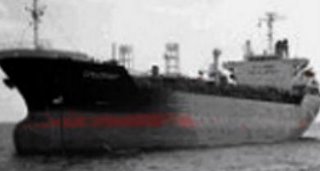
Reported here, the missing chemical/vegetable oil tanker Steadfast has been located and is now in Singapore:
ONE of the largest ships ever hijacked has been found in Indonesian waters after five days.See this for some ONI speculation that seems to be contradicted by the IMB.
The Steadfast (above) went missing on Dec 19.
Action by the region's law enforcement agencies led to the recovery of the Steadfast and its crew.
The 17,659-dwt chemical tanker, operated by Singapore-based Raffles Shipmanagement Services, arrived safely in Singapore on Christmas Eve, reported Business Times.
Hunted throughout South-east Asian waters, the pirates had apparently turned the tanker back towards Indonesia and left the vessel on 24 Dec when it was in Indonesian waters.
The ship's master brought the Steadfast safely back to Singapore, arriving at 1.30 pm the same day...
...The Steadfast was seized by pirates shortly after leaving Palembang in Indonesia for China with a cargo of 16,585 tonnes of vegetable oil - which was probably the pirates' target.
The director of the International Maritime Bureau, Capt Pottengal Mukundan, told BT: 'The 25-strong crew, the vessel and its cargo are safe.
'It was vital the authorities deal with this hijacking effectively to deter further attacks of this kind.
'We congratulate the law enforcement agencies, particularly the Indonesian Navy, for their prompt and positive support.
'We believe it was the action taken by them which dissuaded the pirates from proceeding with the illegal discharge of the cargo.'
Steep learning curve? WFP sends more relief food to Somalia by ship
The World Food Program is still trying to get food to the starving masses of south Somalia as reported here, and is going to try ships again, despite the frequent pirate seizures of WFP ships:
One of the problems with the UN is the endless number of "donor" meetings that need to be held to see if someone will step up to the plate and provide escorts or more.
Of course, no one wants to get stuck in the Somalia quagmire, either.
The World Food Programme has resorted to alternative ways of shipping relief food from the Mombasa Port to thousands of hunger-stricken people in Somalia.I think it's time for some of the NATO forces to lend a hand here, along with Kenya and perhaps South Africa. The UN cannot allow another Rwanda-sized disaster to occur because the member nations seem to be waiting for the US and Britain to sail to the rescue and the others are too weak and or timid to do the right thing. If the US were to go in, I would suggest taking over the whole damned country and disarming every warlord and restoring order. And if anyone criticizes the effort, let them provide a plan for how to save the 2 million starving Somalis without taking the country over in a "caretaker status."
Mr Leo van der Velden, WFP deputy country director, on Wednesday said the UN agency, together with Care International, are using Dubai vessels to ship relief cargo. He said Dubai contractors are moving 1,000 metric tonnes of food aid for WFP and 2,400 tonnes for Care to Somalia.
Velden warned that the drought and famine situation in Somalia, especially the southern part, had worsened just like in northern Kenya. He said currently, only 1,500 metric tonnes of food could be delivered while over 43,000 metric tonnes worth US$ 32 million is required. He said escorts have been requested from Kenya Navy and Somali coalition forces to protect transporters from sea pirates...
...Due to piracy in the Somali waters, he said, land transport services through Mandera to Bay and Bakol in Somalia had been set up. He said the port of Merka in south Somalia is being used for small-scale shipments while navy protection has been requested by main shipping agents to restart the use of the port on a larger scale.
Velden said the Kismayu port is at the moment closed for all UN activities following the killing of their staff early this year.
In a Press statement, Velden said about 2 million people in southern Somalia were at risk of starvation.
One of the problems with the UN is the endless number of "donor" meetings that need to be held to see if someone will step up to the plate and provide escorts or more.
Of course, no one wants to get stuck in the Somalia quagmire, either.
Required reading: The games people play
Actually, this post from the excellent blog Transatlantic Intelligencer is titled "Are 500,000 Keys to Paradise Enough?: Germany "Confronts" Ahmadinejad" - but the subject matter is the very dangerous game being played by Germany in not really taking action against Iran. It is today's required reading.
Concept: Building predictability into the Army Reserve
In what appears to be a common-sense approach to getting Army Reserve personnel on a reasonably predictable track for "deployment ready" status, the Army Reserve is setting out an schedule for training and readiness as reported here:
As a long time reservist (albeit in the Navy Reserves), I appreciate the logic behind the plan. In fact, I argued for a similar program for certain reserve units based on the Navy's long-standing system of working up to deployment for active forces. The idea is to allow the reservists to be able to warn their employers and family of the periods when they might be called up and allow some personal planning of the sometimes challenging reserve/civilian interface. In addition, the active force can have confidence that they are getting fully qualified reservists for service.
I hope the plan helps the reservists and the Army.
Almost all Army Reserve units will be assigned to an Army Reserve Expeditionary Force package, which follows a five-year cycle to prepare for a potential deployment, the general explained.
During the first year of the cycle, members will focus on individual training: schools, qualification courses and training programs that range from initial military training to basic and advanced officer and noncommissioned officer courses to Command and General Staff College, Sherlock said.
During the next three years, soldiers will build on their individual training by moving through a variety of individual and collective unit training events. These will culminate with certifying events that demonstrate that unit members are trained and ready to perform their mission, Sherlock said.
During the fifth year of the cycle, these fully trained troops will become part of a ready pool available for missions, whether stateside or overseas, he said.
The Army Reserve Expeditionary Force model will bring structure and continuity to reservists' training while eliminating some of the uncertainty they face about potential deployments, Sherlock said.
As a long time reservist (albeit in the Navy Reserves), I appreciate the logic behind the plan. In fact, I argued for a similar program for certain reserve units based on the Navy's long-standing system of working up to deployment for active forces. The idea is to allow the reservists to be able to warn their employers and family of the periods when they might be called up and allow some personal planning of the sometimes challenging reserve/civilian interface. In addition, the active force can have confidence that they are getting fully qualified reservists for service.
I hope the plan helps the reservists and the Army.
Latest ONI World Wide Threat to Shipping (to 21 Dec 2005)

For the latest ONI WWTS go here and click on the date. Highlight:
SOUTH EAST ASIA:My earlier report on the Steadfast here, on the "palm oil" tanker here, on one of the "tin" ships here and a report that includes more information on the "sunken" tin ship here.
1. INDONESIA: Chemical tanker (STEADFAST) suspected
hijacked as of 19 Dec while enroute from Palembang, Indonesia to
Singapore. An IMB special alert dated 20 Dec reports the tanker
lost contact with their vessel as of 19 Dec. The tanker departed
Palembang, Indonesia for Singapore on 18 Dec laden with 16,585
MT of vegetable oil. Vessel’s last known location reported by the
owner was 02:20N 106:41E at 0530 UTC on 19 Dec. ONI Comment:
In April of this year, pirates boarded a general cargo ship laden
with tin ingot in Indonesian waters, forced the crew to take the
vessel to a port in Malaysia and offload the cargo before returning
to Indonesian waters and releasing the vessel and crew unharmed.
The cargo was later found intact by Malaysian authorities in the
same location it was offloaded. In July, pirates boarded a tug and
barge while awaiting berth in a port in Malaysia and siphoned
approximately 3,500 MT of crude palm oil into another product
tanker. The Malaysian Marine Police found the product tanker and
arrested the crew while the Indonesian Navy Pursuit Team arrested
five individuals believed to have perpetrated the theft. In
September, a general cargo vessel laden with 660 tons of tin ingot
was boarded by pirates while underway off Indonesia. The 14
crewmembers were set adrift in a fishing boat and laded safely on
land. The vessel was later discovered sunk not far from where it
was hijacked and salvage divers assessed the cargo to be intact.
These incidents appear to represent a form of piracy not reported
since China’s crackdown on black-market activity starting in 1998,
wherein a ship is targeted for seizure at its load port and the
cargo is taken to some destination where arrangements for disposal
have already been concluded. The complexity of the operation
suggests transnational players at the ship selection and cargo-
disposal ends of the operation. In these types of cases, crew and
ship owner complicity must be considered, since they have no
immediate financial interest in the cargo, per se. Since the
crackdown on the illegal Chinese markets, hijackers have experienced
difficulty disposing of their cargos. If the STEADFAST is indeed
hijacked and is not rapidly located and its cargo recovered, or
traced, this could be a sign that criminal gangs have solved their
problem with disposal of stolen goods
Tuesday, December 27, 2005
Algerian naval vessels attacked by terrorists?
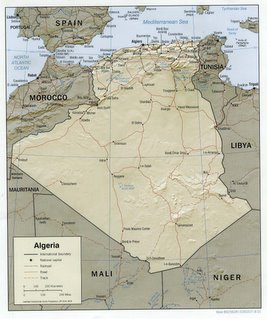
The Counterterrorism Blog reports here:
According to the statement, "[t]hanks to precise intelligence that was gathered on a coast guard ship—and despite the heightened security measures that were put in place in the vicinity of the port—the courageous mujahideen succeeded in sneaking into the port using their own special means, no doubt with the blessing of Allah. The mujahideen proceeded to plant two bombs inside the port. The mujahideen quickly set off the first device against the evil tyrants as soon as the warship approached it. When a second group [of infidels] neared the scene in order to help the wounded and recover the victims, the mujahideen set off their second device."Doesn't seem to be widely reported...
UPDATE: Added map of Algeria.
Holiday Routine
Take four kids all zipping in (and out and in and out) ... two from California, one from Virginia,and the one who remains at home. Add in friends and spouses.
Toss in a health crisis with the grandmother in Florida (not too serious but nobly being covered by the Mississippi sister- we owe her- big time).
Toss in last minute things like tree decoration (Christmas eve), last minute shopping, the different hours kept by the time zone warriors and a million other details too mundane to mention, but all of which take time...
Tree, turkey, presents, family!
Wheee!
Toss in a health crisis with the grandmother in Florida (not too serious but nobly being covered by the Mississippi sister- we owe her- big time).
Toss in last minute things like tree decoration (Christmas eve), last minute shopping, the different hours kept by the time zone warriors and a million other details too mundane to mention, but all of which take time...
Tree, turkey, presents, family!
Wheee!
Saturday, December 24, 2005
Merry Christmas!
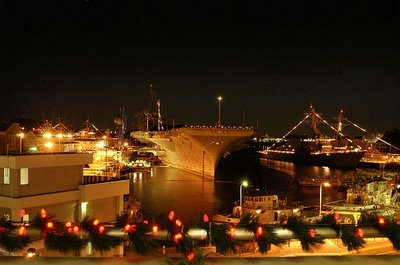
The aircraft carrier USS Kitty Hawk (CV 63), center, along with other U.S. Navy Seventh Fleet ships, show their holiday spirit on Christmas Eve 2005 with a colorful display of friendship lights. Several other Sailors from Carrier Strike Group Five (CSG-5) participated in decorating their ships from bow to stern in holiday colors. Currently in port, Kitty Hawk is the only permanently forward-deployed aircraft carrier, and is home ported out of Yokosuka, Japan. U.S. Navy photograph by Photographer's Mate Airman Thomas J. HoltFor many of us who had to spend Christmas on board ship, the Christmas meal was usually a treat - here's a pre-WWII example:

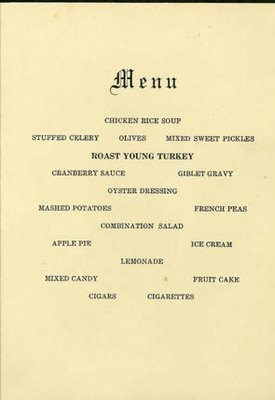
For all the sailors, Marines, soldiers and airmen who are serving around the world, thanks for being there and have the Merriest Christmas you can. We'll save some turkey and pumpkin pie for you.
Some stowaway news
"Stowaways?" reported here:
The Maltese container ship Sint-Elmo departed from the Antwerp port according to schedule on Thursday night following the discovery of 10 stowaways on board the vessel earlier this week...
...The ship departed at about 10pm after public prosecution questioning and specialist investigations indicated the captain and crew had not been aware that the illegal immigrants had accompanied them on the original passage from Lagos, Nigeria...
The stowaways were found in a cramped cavity above the ship's rudder. The rudder room is accessible from outside the boat...
...The number of stowaways reaching Antwerp harbour has fallen to 60 per year compared with 200 several years ago. The decline is due primarily to tighter port security since the 11 September terrorist attacks in the US in 2001.
Friday, December 23, 2005
Guiding ships from Oklahoma
Reported here,something to make every Midwestern heart fill with pride- Nebraska has the Strategic Forces Command and now OKlahoma has ...Weathernews:
An office in landlocked Norman is helping ship captains around the world navigate hazards and find the best possible route for their cargo.Of course, when they are done for the day, the Weathernews staff is still in Oklahoma (not that there's anything wrong with that...). The US Navy weather guessers (at Fleet Numerical Meteorology and Oceanography Center) hang out in Monterey, California. Let'see. Norman, OK or the Monterey peninsula? Which would you choose? Sometimes civilians do not get the better deal...
Flat-screen monitors and movie-screen size maps of the world fill the office of Weathernews. Employees look between multiple computer screens to determine where potential hazards could be for companies transporting goods and commodities all over the world.
Weathernews, a Japanese company with offices worldwide, is taking advantage of the University of Oklahoma's meteorology program and the steady supply of qualified workers. From its Norman office, ship captains in the Arctic Ocean are warned about icebergs and captains off the coast of Somalia are cautioned about pirates.
Thursday, December 22, 2005
Gasoline prices -don't bother me with reality, I have a conspiracy theory
Choose one.
Gas prices are being set by:
(1) Consumer demand and availability;
(2) A secret cabal of gasoline price setters within Big Oil; or
(3) George "It's all his fault" W. Bush
Now, having made your choice, read this. If you agree with Bill O'Reilly, then I have some wonderful ocean front property in New Mexico for you to buy...
Gas prices are being set by:
(1) Consumer demand and availability;
(2) A secret cabal of gasoline price setters within Big Oil; or
(3) George "It's all his fault" W. Bush
Now, having made your choice, read this. If you agree with Bill O'Reilly, then I have some wonderful ocean front property in New Mexico for you to buy...
Latest ICC Commercial Crime Services Weekly Piracy Report (to 19 Dec 05)
For the latest ICC Commercial Crime Services Weekly Piracy Report go here.
China and the Asian Future
Interesting analysis from the Hoover Institution by Dana Dillion and John Thacik on China here (Hat tip: From a Singapore Angle):
UPDATE: A companion piece?
But anyone who concluded from the Times and Post accounts that in 2005, China was merely a bit player in Southeast Asia — or anywhere else in the world — would be dead wrong. Beijing’s political leaders know that superpowers aren’t measured by their foreign aid budgets, or by their economies. They are measured by their ability to use their comprehensive national power — economic, political, and above all military — to gain the obeisance of their neighbors and their regional and global rivals...Well worth the the short time it takes to read it all.
...One reason the United States is losing influence in Southeast Asia is because it is no longer feared. Of course, it isn’t much loved, either. Though its humanitarian compassion seems to be taken for granted — Americans can always be counted on to help in a disaster or crisis — its attention has been distracted from the region by military and terrorist challenges in the Middle East and nuclear blackmail from North Korea.
From a geostrategic standpoint, strong countries surround China. Japan and Korea lie to the east, Russia to the north, India to the west. The only outlet for Chinese imperial ambitions is Southeast Asia. Most Southeast Asians understand that China is rapidly becoming the predominant power in the region and already behave accordingly. Beijing’s diplomats have effectively translated China’s burgeoning economic clout into political influence, leaving in question the U.S. role in and commitment to the region, even with its traditional allies and friends...
...The U.S. is passively relinquishing its influence in Southeast Asia to China through its apparent lack of interest in Asian economic, security, and political issues. Recovering from wasted years in which we ignored the warning signs of regional Chinese political clout will require a shift in U.S. policy toward mending tenuous alliances that have been unattended or, in some cases, have grown cold. It is not too late to regain the trust and confidence of Asia and reaffirm our commitment to the security and economic development of the region. But that trust must be earned through a thorough, consistent, and determined foreign policy.
UPDATE: A companion piece?
... The guiding philosophy for Chinese international relations in the 21st century is set out in this white paper - we make money, you'll make money too, and we'll all be happy - happy enough to leave each other alone in terms of internal issues. It invokes Chinese history constantly to prove its point.
The trouble, as I've said before, that what China considers 'internal affairs', its own 'Monroe Doctrine', if you like, has been a continually shifting set of territories. France and China went to war in 1884, for instance, over who had a stronger sphere of influence in Vietnam (China lost, but evidently tried to re-establish it unsuccessfully in 1979). China has throughout history tried to exert its influence in much the same way a Godfather (in the Puzo sense) does, in setting up tributary relations for all bilateral ties. Let us hope China does not revert to historical norm on this front as well.
Wednesday, December 21, 2005
Vegetable oil tanker goes missing in South China Sea- pirates?
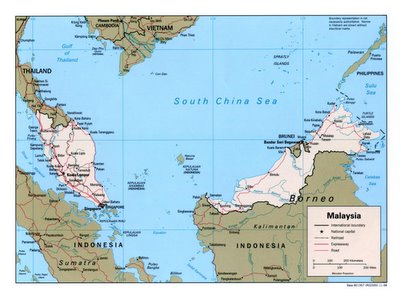
The tanker Steadfast carrying 16,000 metric tons of vegetable oil is missing and pirqacy is suspected as reported here:
Regional marine police and navies were hunting Wednesday for a Singapore-owned ship and its crew, feared to have been hijacked by pirates in the South China Sea, a maritime official said.An attack outside the Malacca Strait may mean the deterrent patrols in the strait have caused the pirates to seek safer waters to work in.
The Steadfast, a chemical tanker carrying a cargo of vegetable oil, departed Palembang in Indonesia on Dec. 18 and was due in Singapore the following day, said Noel Choong, head of the Piracy Reporting Center of the London-based InternationalMaritime Bureau.
"Its last contact with the owners was on December 19 at 0530 GMT. Thereafter the owner lost contact with her," Choong told AFP.
"It is suspected to have been hijacked by pirates after departing Palembang. The regional authorities are looking for her," he added.
Chong said regional marine police and navies were involved in the search, but declined to specify which countries they were from.
The waters where the vessel went missing are bounded by peninsular Malaysia to the west, and Indonesian and Malaysian parts of Borneo island to the east.
UPDATE: Not the first vegetable oil tanker being taken by bad guys - remember the "palm oil tanker?"
Tuesday, December 20, 2005
N.Korea, acting up again, says it will build light-water nuclear reactors

Sometimes the DPRK just appears to be part of an Alice in Wonderland experience as this report indicates - the DPRK simply is out to blackmail the world.
Six-country talks to try to end North Korea's nuclear weapons programs have stalled and diplomats said the latest comment from the North's official KCNA news agency could complicate an already difficult negotiating process further.Expect to be threatened with a nuclear sea of fire at any time.
Pyongyang had not said before it planned to build relatively proliferation resistant light-water reactors (LWRs), but had threatened to resume work on two graphite-moderated reactors (GMRs), which can produce large amounts of material for atomic bombs, a South Korean Foreign Ministry official said.
Taiwan to build airfield on one of the Spratly Islands - confronting China
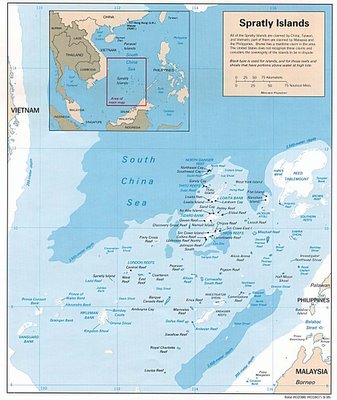
Reported on and editorializedabout here, a direct confrontation building between Taiwan and China:
In mid-March, the national oil companies of the Philippines, Vietnam and China signed an accord to conduct research in the Spratly Islands for economic purposes. Last month, China signed a communique with Vietnam to state that the agreement was an important contribution to realizing the aims of ASEAN's Declaration on the Conduct of Parties in the South China Sea, bringing about greater stability and harmony to the region.
China and Vietnam also agreed to provide active support for companies operating in the area to ensure that the agreement was adhered to, and that cooperation could achieve rapid results.
China followed this with a series of declarations signed with other nations stating that the South China Sea had become a "sea of peace, amity and cooperation." Taiwan, of course, was ostracized from all of this. For Taiwan, the South China Sea is not the sea of cooperation, but one of infractions of its territorial rights. It is not a sea of friendship, but a sea of animosity from which Taiwan is being driven. If Taiwan does not act to counter this, all rights to the area will be given away.
Now that construction of the landing strip has been confirmed, all agencies involved should actively cooperate and look more closely at ways of protecting the nation's territorial claims in the South China Sea. This will be necessary if we are to pave the way for effectively exploiting its resources, maintaining secure air links and maritime security and finding an opportunity to participate in regional dialogue.
We should also pay attention to the response of countries in the region, especially China, Vietnam, the Philippines and Malaysia.
In addition, Taiwan should strengthen its defense of Ita Aba and give considerable thought to whether the navy should again assume this duty, or whether a coast guard detachment should remain at its post.
Monday, December 19, 2005
And now... the honey gatherers of Bangladesh and tigers and pirates, oh my!
Noted here: Each spring, like Klondike prospectors looking for the mother lode, the honey hunters go deeply into debt to rent boats for their journey through a vast warren of muddy saltwater rivers and channels that meander around thousands of jungle islands.
They have to stock up on food and supplies for trips that last up to three months. And they have to grease the palms of corrupt forestry officials. The honey hunters wager everything, including their lives, against pirates and the whims of wild animals, including pythons, king cobras, crocodiles and the man-eating Bengal tigers. The lure of liquid gold is stronger than their fears.
Abdul Ghafoor Ghazi was gathering honey in the forest last year when a tiger pounced on his back and clamped its jaws down like a vise, killing him instantly.
They have to stock up on food and supplies for trips that last up to three months. And they have to grease the palms of corrupt forestry officials. The honey hunters wager everything, including their lives, against pirates and the whims of wild animals, including pythons, king cobras, crocodiles and the man-eating Bengal tigers. The lure of liquid gold is stronger than their fears.
Abdul Ghafoor Ghazi was gathering honey in the forest last year when a tiger pounced on his back and clamped its jaws down like a vise, killing him instantly.
Electronic sea charts of Malacca Strait
Strait of Malacca navigation enters the 21st Century as reported here:
Japan, Indonesia, Malaysia and Singapore have jointly drawn up electronic sea charts of the Malacca Strait and Singapore Strait, the Japan Coast Guard said Monday.
Japan took part in the project to help prevent accident or piracy in the areas as most of tankers carrying oil to Japan pass through either of the straits, which serve as key international maritime traffic routes in Southeast Asia.
The charts can be displayed in scales up to one to 50,000. It is the first time that detailed electronic sea charts of international straits have been formulated, the Coast Guard said.
Ships with an electronic sea chart system, which is like a car navigation system, can see the charts with the location of the vessel itself displayed.
The charts incorporate the digitalized data of ordinary sea charts, setting off an alarm when the ship approaches shallow waters or other dangerous areas.
And now, the seashell pirates of India....
Reported here:
One man, a website, three states, over a thousand employees and businesses across the world — every bit of the plan to denude the coasts of peninsular India of its treasures was in place. For the last half a decade, a multi-crore nationwide racket collected sea shells, conch and precious coral and sold these globally. All these are banned and endangered sea animals under the Wildlife Protection Act 1972.
Somalia pirates killing each other over ransom money
Looks like an old problem of piracy- how to split the loot- is rearing its head in Somalia as reported here:
Fighting triggered by a dispute over sharing of ransom money has erupted between two Somali militia groups, which have been taking sailors hostage off the Coast of Somalia.
The two groups clashed over cash paid as ransom to secure the release of some 48 Asian sailors who had been held in Somalia for over three months on three fishing vessels.
Mr Andrew Mwangura, a maritime expert, said in Mombasa on Sunday that at least two people were killed in gunfire between Juba Valley Alliance (JVA) and National Volunteer Coast Guard (NVCG). The groups are different from hijackers who recently released 30 Kenyan sailors held near Mogadishu.
Sunday, December 18, 2005
Battle of the Bulge began 61 years ago
Reported by the BBC here:
The Germans have mounted a series of counter-attacks on the Western front allowing them to re-cross the borders of Luxembourg and Belgium.It was a very near thing.
On the second day of what now appears to be a full-scale counter-offensive, the Germans are attacking with tanks and aircraft along a 70-mile front guarded by American forces in the Ardennes region.
The main thrust has been launched from the northern Ardennes near the town of Monschau. Two further attacks have taken place further south.
German paratroops have been dropped behind Allied lines. Allied army reports say some of them have been "mopped up", others are still at large.
Saturday, December 17, 2005
Latest ONI World Wide Threat to Shipping Report (to 14 Dec 2005)
For the latest ONI WWTS Report, go here and click on the date. Highlights:
1. GULF OF ADEN-SOMALIA: An unidentified general cargo
ship reports being chased 11 Dec at 0810 local time while underway
in position 13:07N – 049:13E by persons in a small speedboat who
attempted to board. Boarding was averted when master increased
speed and undertook evasive maneuvers (IMB).
.
2. SOMALIA: An unidentified general cargo ship reports
being chased by an unidentified fishing trawler 12 Dec at 0200 UTC
while underway in position 04:50.5S – 048:00.0E. Cargo ship
undertook evasive maneuvers but trawler drew closer to 1.4 nm
until abandoning the chase when cargo ship increased speed.
Trawler, described as 50 to 60 mtrs long, white hull with single
boom abandoned the chase when ship increased speed (IMB).
1. INDONESIA: An unidentified tanker reports approach 11
Dec at 2000 local time while anchored in position 01:55S – 1
17:14E, Senipah, Indonesia. An unlit boat approached close to the
stern. Crew alerted terminal via VHF, raised alarm and directed
searchlights at the boat, which fled when a patrol boat arrived
(IMB).
.
2. INDONESIA: An unidentified tug was boarded 8 Dec at
0430 local time while anchored in position 05:58.4S – 105:58.6E.
at Tanjung Gerem Merak. Eight persons armed with long knives
escaped to a waiting speedboat when crew raised alarm (IMB).
.
3. INDONESIA: An unidentified bulk carrier was boarded 8
Dec at 0330 local time while anchored in position 05:54S – 105:59E
at Merak. One person armed with a long knife boarded but fled
empty handed to a waiting boat with accomplices when crew raised
alarm (IMB).
.
4. INDONESIA: An unidentified bulk carrier was boarded
7 Dec at 2010 local time while underway in heavy rain in position
03:17S – 116:24E off Tanjung Mangkok, North Sebuku Island. Two
persons armed with long knives stole forward liferaft and were in
the process of stealing stores when confronted by crew. They
jumped overboard to a awaiting speedboat (IMB).
.
5. INDONESIA: An unidentified bulk carrier was boarded 6
Dec at 0520 local time in heavy rain while at Bontang anchorage.
A single robber stole ship’s stores and escaped with accomplices
in a waiting boat (IMB).
Thanks!

Thanks to all of you who took the time to vote for EagleSpeak in the 2005 Weblog Awards.
Against some great competition this humble corner of the blogosphere came in 6th in the Best of the Top 2501-3500 category with 6.09 % of the votes!
Thanks for reading and thanks for taking the time to vote!
China's "soft power"
An opinion here as to why China's "soft power" mojo is better than President Bush's:
Beijing's maritime diplomacy blends the traditional elements of national power -- diplomacy, economics, military force -- in sophisticated fashion. It also makes use of "soft power." Harvard University's Joseph Nye, who coined the term, declares that a country rich in soft power boasts cultural attributes that make its society attractive to foreign peoples -- augmenting the routine tools of foreign policy.Sounds like simple Bush-bashing to me. And, no I'm not shocked that "Chinese leaders agree." The topper in this heap of baloney is "This, say Chinese spokesmen, makes a welcome contrast with Western imperialism: China makes a more trustworthy steward of Asian maritime security than any non-Asian power." If you believe that, I've got some nice ocean front property in New Mexico...
For Nye, such manifestations of culture as movies, clothing and popular music play a role in international affairs, creating an atmosphere of international goodwill -- an affinity between peoples that a country's leaders can use to rally support for their foreign-policy initiatives. Nye worries that the administration of US President George W. Bush squandered US soft power in Iraq, but he assures us that China, traditionally Asia's central power, possesses abundant reserves of it. Chinese leaders agree.
Thursday, December 15, 2005
Understatement of the Month: "Somalia: A state of utter failure"
By the Economist:
The main hope for peace lies in the northern parts of Somalia: in Somaliland, which used to be a separate British colony, and is now relatively peaceful and well governed, and in Puntland. Somaliland has in effect seceded from Somalia, and yearns for full legal independence. Puntland, Mr Yusuf's own stronghold, which was the northern part of Italian Somaliland, is now pretty autonomous, but its leaders prefer to see Puntland as a building block for a future federal Somalia.Worth reading it all, for the Economist sees some glimmer of hope. However, that's sort like looking for the pony in a room full of horse manure, in my view.
Meanwhile, the rest of the country is wretched. Most people are illiterate. Only 18% of children go to primary school. Garowe, Puntland's dusty capital, is swollen with migrants from the south. Its slums are spreading, the wells are contaminated, cholera occasionally breaks out, and polio has reappeared. Habitat, a UN agency that tries to provide housing and shelter, is struggling to bring some order here and in other Somali towns.
But it is more trade, not aid, that might improve things the most. Saudi Arabia could help by restoring its imports of Somali livestock that were stopped in 2000, and Somalia needs help developing its offshore fishing waters, which are being plundered by foreign boats.
Well, duh: New Oil Pipeline Seen as Boon to China
You'd almost think the Chinese planned to have an oil pipeline running to their country, given the benefits extolled here. Why it may even provide a source of oil if the nasty old USA decides to blockade the Strait of Malacca. Of course, no one would ever target an oil pipeline being used by an adversary in time of war, would they?
US, Japan and China may be asked for technical assistance in Malacca security
The Malacca littoral states may seek technical assistance for anti-piracy and anti-terrorism patrols, as reported here:
UPDATE: Okay, maybe it's not a little worry:
The United States, China, Japan and other powers may soon be asked to contribute equipment and expertise to help fight threats such as piracy in the world's busiest shipping lane, officials said Thursday.Just a little worried about sovereignty, aren't they?
Foreign assistance in the Malacca Strait will be sought to strengthen air patrols launched last September by Malaysia, Indonesia and Singapore, the three countries that border the route, Indonesian Defense Minister Juwono Sudarsono said.
"Other nations can be invited to help us in technical matters, but they will not be approached to send their maritime forces here," Sudarsono said after holding discussions on border security with his Malaysian counterpart, Najib Razak.
UPDATE: Okay, maybe it's not a little worry:
"The fact is that littoral states lack the assets and technology to ensure thorough monitoring.
"But whatever the (foreign) involvement, it cannot be at the expense of our sovereignty or territorial rights," Najib said while chairing the 34th Malaysia-Indonesia general border committee (Malindo GBC) meeting here.
Wednesday, December 14, 2005
CIA help for Turkey
Request for some CIA assistance reported here. For the most part, the Turks have been reliable allies for almost 60 years.
Pirate fighting robots?
Holy unmanned boats, Batman!
Robotic escort vessels to deter pirates.
Well, it could work.
Wonder what the going rate for radio frequency jammers will be with the pirate crowd?
Robotic escort vessels to deter pirates.
Well, it could work.
Wonder what the going rate for radio frequency jammers will be with the pirate crowd?
Biodiesel in Thailand
Alternative fuel start-up in Thailand reported here. Government control of price for raw materials is an issue:
The volatility of diesel fuel prices and palm oil prices makes biodiesel production a precarious investment. If diesel fuel prices are high and palm oil prices are low, the investment is a no-brainer. But that is seldom the case.Interesting balancing act.
To help out the farmers, the government controls the production of palm fruit in order to keep prices as high as possible. And to help out motorists, the government tries to keep prices at the pump as low as possible.
To say the least, balancing the prices of the two commodities is a delicate process.
“If the price of palm fruit is too low, then we won’t have enough raw materials to make the fuel,” Weera says. “On the other hand, if the price of biodiesel is too high then nobody will use it. We have to balance giving the farmer a high price and keeping the cost low enough so people will switch from regular diesel.”
Golden Biodiesel’s own cost structure bears this out. To produce one liter of pure B100 biodiesel, the company spends about 20 baht – 15 baht for a kilogram of raw materials and five baht for processing.
To encourage the use of biodiesel, Golden Biodiesel sells it 10-15 percent cheaper than regular diesel. Since diesel now sells for 22.69 baht per liter at pumps across the country, Weera’s firm barely covers its expenses.
The problem is that raw material (palm oil, vegetable oil or stearine, a kind of vegetable fat) costs can range from as low as 13 baht per kilo up to about 17 baht. If the price of raw materials shoots up at the same time global diesel prices fall, then all of a sudden Weera is losing lots of money before his feet are firmly on the ground.
"Risk-based" security? What a concept!
Senator John Cornyn gets it right here:
...last week the 9/11 Commission as part of the 9/11 Public Discourse Project gave the government an "F" for its failure to provide homeland security grant monies to those cities most at risk for a terrorist attack.On an issue like security for our major ports, "politics as usual" should be displaced by some simple common sense and not pork barreling.
Continuing to distribute these funds throughout the nation irrespective of actual risk to particular states and communities is an irresponsible and dangerous proposition. For cities such as Houston — one of the largest petrochemical complexes in the world, with a ship channel valued at more than $15 billion — a terrorist attack would have devastating consequences that would penetrate well into the country's interior. Consider that the U.S. Coast Guard estimates the national economy would take a $60 billion hit for a one-month closure of a major port such as Houston...
...Our country has sacrificed too much to fail to heed the lessons of Sept. 11, 2001. Proposals to continue distributing significant amounts of critical funds to all states that are based on arbitrary minimums, regardless of risk, are not only inadequate, they are irresponsible. Such an approach to homeland security is pursued at the peril of our nation's most vulnerable population centers and critical infrastructure.
Tuesday, December 13, 2005
Philippines: Stockpile ethanol to regionally counter the oil crisis
Interesting idea from President Arroyo of the Philippines set out briefly here:
President Arroyo yesterday called on Japan and South Korea to venture on energy cooperation with the Association of Southeast Asian Nations (ASEAN), particularly in setting up a regional stockpile of ethanol fuel, to counter the threat posed by fluctuations in world oil prices...By the way, last time I checked, the Philippines didn't have a large stockpile of oil for emergencies.
...The President also encouraged Japan and South Korea to join cooperative efforts to intensify oil and gas exploration in the disputed China Sea similar to the joint seismic cooperation among the Philippines, Vietnam and China in the South China Sea.
"We should be able to work effectively to secure energy resources for our region," she said in her remarks during the summit here as she emphasized the need to mitigate the effects of the rising oil prices on peoples and economies.
Mrs. Arroyo suggested that ASEAN, with the help of its dialogue partners, immediately embark on reviewing arrangements for a regional hub/exchange for ethanol fuel to ensure a steady supply of fuel for the region in case of an oil shortage or disruption.
Arroyo offered the use of the Subic Bay Terminal Freeport as the site for the planned oil hub in the region. She noted that Japan has already assisted the Philippines and Thailand in making feasibility studies on oil stockpiling.
She also urged ASEAN, Japan and Korea to pursue investments on energy infrastructure and the development of "promising" alternative and indigenous energy sources available in East Asia such as ethanol, coco-diesel, wind and solar energy.
She said they could invest collectively in ethanol plants in Southeast Asia’s sugar-producing regions as well as in the production of diesel oil from coconuts available in the Philippines and Indonesia.
Arroyo noted that Korea has invested heavily in electric power plants in the Philippines and contributed to the electrification in the countryside.
The President, meantime, urged Japan and Korea to follow the model of the Philippines, Vietnam and China currently conducting oil and exploration in the disputed waters of the South China Sea in resolving their bitter claims over China Sea
ReliefWeb:� Humanitarian situation in Somalia: Monthly analysis, Nov 2005
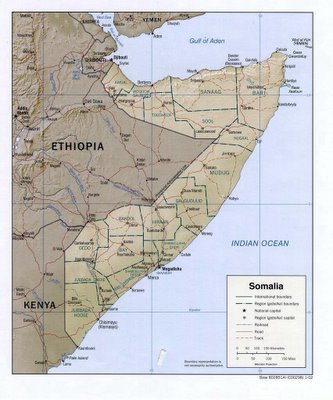
UN ReliefWeb report on, among other things, the impact of the Somali pirates on aid flow (or not) to the people of Somalia here:
Continued sea piracy along the Somali coastline is impacting on humanitarian supply pipelines into southern Somalia. Because of hijackings, WFP's food aid stocks in the country are at an all-time low and for the first time in almost five years, the Agency has had to transport food aid into Somalia overland through Kenya. Given the already challenging operational environment in southern Somalia where insecurity dictates the restricted nature of access, the implications of piracy pose an added obstacle to meeting the needs of highly vulnerable populations. Furthermore, these developments are coming at a time when the humanitarian situation in south central is getting worse and the number of those in need is increasing...While some have questioned whether the issue of taking on the pirates is being driven by the maritime insurance carriers, my view is that the interim Somali government needs to take a number of drastic steps to establish some control over its sovereign water.
...Incidences of sea piracy continued this month off the Somali coast. Three Taiwanese fishing vessels (and the 47 crew members) hijacked in June 2005 are still held hostage on the island of Koyaama, southwest of Kismayo. Various other ships were hijacked and held until unspecified ransoms were paid to the pirates. On 5 November, the luxury cruise liner "Seaborne Spirit", managed to outrun pirates some 100 nautical miles off the coast of Puntland. Several sources claim a "mother ship" is directing the attacks by the smaller speedboats, including the Kenyan Seafarers' Association which appealed for more information to track the ship down.
The UN remains highly concerned about the humanitarian implications of continued piracy as they affect supply pipelines into Somalia, particularly food and fuel. As an alternative option for relief food delivery, for the first time in almost five years, WFP has started to transport food overland through Kenya to target beneficiaries in southern Somalia. A convoy of 18 trucks carrying 500 metric tons (MT) of food arrived successfully in Wajid, Bakool region on 4 December. Still, the 1,200 kilometer journey through Kenya is not an easy one and trucks had to pass through 25 militia checkpoints once in Somalia. It is also 25-30% cheaper to bring food aid in by sea than it is overland and boats can carry more. So far, supplies to northern Somalia are not affected but the UN is seeking ways of addressing the issue, particularly at a time when the humanitarian situation in southern Somalia appears to be worsening. The TFG has meanwhile reportedly signed a two year deal with "Topcat Marine Security" to safeguard the Somali coastline.
The UN, as usual, is a pretty weak vessel for taking such action because it has no military forces of its own to commit to thwart the pirates. It seems logical to me that the UN should continue to send food by ships, albeit ships escorted by naval vessels. I think the French, Germans, Dutch and South African navies have the right warships to accomplish such an escort mission.
What is missing is the political will to commit forces once again to the failed state of Somalia for fear of being dragged back into the on-going conflict. However, if there is ever to be a situation in which the UN should undertake a determined show of force, it is in Somalia. It is a "broken window" that urgently needs fixing before it spawns even more trouble for its neighbors and the international commerce that flows off its shores. This is a case of the need for "nation-building" as strong as those undertaken in the past by the US Marines as set out so well in Max Boot's book, The Savage Wars of Peace: Small Wars and the Rise of American Power and by the British in their colonial work. Kenya is already feeling the impact of the disorder to its north, as noted here, here, here and here. In the last post, I noted
Somalia is a major regional problem and needs to be addressed sooner rather than later....The Indian Ocean port of Mombasa is a major shipment point for coffee and tea exports for Kenya -- two of the biggest foreign exchange earners.
It is also a key gateway for imports and exports to Uganda, Burundi, Rwanda, eastern Congo, southern Sudan and Ethiopia.
I would expect that Uganda, Burundi, Rwanda, eastern Congo, southern Sudan, and Ethiopia will experience a "ripple effect" of increasing costs.
UPDATE:

The South African Navy has just the type of ship I think would be an excellent escort here.
Kenya's navy escorts cruise ships in Kenyan waters

Hoping to prevent a spillover from neighboring Somalia's pirates into its territorial water, Keny has begun escorting cruise ships in Kenyan waters as reported here:
The Kenya Navy has stepped up patrols on the Kenyan coastline to stave off pirate attacks on the country's territorial waters.
The increased surveillance follows cases of piracy on the Somali coastline, executed by rag-tag armies of warlords in the neighbouring country, still grappling with the effects of years of war.
With a government that is yet to stamp its authority, Somalia's coastline is providing fertile ground for pirates and lawlessness...
...Military spokesman Bogita Ongeri said: "We are offering the vessel security escort. Its last port of call was the Seychelles before they began approaching our waters. We haven't had any incidents of piracy on our waters but you have heard of them in neighbouring countries. We shall give an escort to any vessel that gives us time schedules."
"Our coastline has radars which can detect approaching vessels. We are alert and the Navy has intensified patrols so that we avoid ugly incidents. As long as there is exchange of information with other countries ... we have the capacity to fully secure our waters," Mr Ongeri told reporters.
The Philippines goes to ASEAN
The president of the Philippines on her ASEAN meeting hopes reported here:
The Chief Executive said she would pursue investments in energy infrastructures and broader collaboration among ASEAN members in new and renewable energy and alternative fuels "if we need to keep our economies humming, and our lights on, through the next three decades."More on the importance of the ASEAN summit here:
She said she will also push for joint efforts by ASEAN, the United States as well as the Shanghai Cooperation Organization composed of China, Russia, Kazakhstan, Kyrgyzstan, Tajikistan and Uzbekistan to ensure and strengthen regional security in this part of the globe.
"Maritime security is also imperative to stop piracy and armed robbery, as well as arms smuggling and human trafficking along the vul-nerable sea lanes of the region. Joint border patrols must be the norm across our common seas," the President said.
The regional grouping needs to "boldly step up the alleviation of poverty in the BIMP-EAGA sub-regions, reinvestments and tourism, making it the broader strategic arena for durable peace and development in Mindanao," she added.
The first East Asian summit of regional leaders in Kuala Lumpur on Wednesday is a historic event whose future impact is likely to be as significant as the first Association of Southeast Asian Nations (ASEAN) summit held in Bali in February 1976.
The first Bali summit led to the emergence of a cohesive ASEAN 5 (Indonesia, Malaysia, the Philippines, Singapore and Thailand) in the aftermath of the emergence of communist regimes in Indo-China.
Today, the presence in Kuala Lumpur of a rising China and resurgent India and the absence of the United States, which has played the role of an Asia-Pacific hegemon since the end of the World War II, suggest we are on the cusp of a new era...
...Wednesday's meeting is significant because it goes beyond narrow geographical definitions or ethnic/racial identity in attempting to lay the groundwork for a new regional institution.
The EAS summit is preceded by the annual ASEAN gathering, separate meetings of the ASEAN leaders with their counterparts from China, Japan and South Korea, and the ASEAN Plus Three (APT) meeting involving the leaders of the 10 ASEAN countries, China, Japan and South Korea.
The inclusion of India, Australia and New Zealand and the presence of Vladimir Putin of Russia demonstrate an outward-looking, inclusive approach to participation in the emerging East Asian regionalism...
...The participation of India, Australia and New Zealand was seen as ensuring that ASEAN remained at the center of any emerging East Asian community. India was also perceived as a balance to China. Indonesia, for example, sought to avoid aligning with China while retaining friendly ties to other powers such as the US, a classic "hedging" strategy...
...For ASEAN states that prefer a regional balance of power, a regional security architecture that is outward-looking and promotes the observance of international norms and codes of conduct is preferable to one dominated by a single power. An active US presence enables this vision of the region's future to be sustained. In future years, the US should therefore participate in the EAS as it is likely to emerge as the key institution for East Asian community-building.
Monday, December 12, 2005
"Insurgents" attack Venezuelan oil pipeline- when will Chavez withdraw?
"Insurgent" forces are wreaking havoc with the government's main source of revenue and no one seems to be able to stop them as reported here:
An explosion that ripped through an oil pipeline connected to Venezuela's largest oil refinery was caused by government foes attempting to disrupt congressional elections, officials said Sunday.Probably not a good time to be on the "usual suspects" list...
Interior Minister Jesse Chacon said C-4 explosives were used to blow up the pipeline Saturday night and that officials believed the act was aimed at trying to destabilize the country.
"We already know who is behind this situation, and we have made some arrests," Chacon said, without giving details.
Being a Somali pirate captive...
Reported as "Sailors recount ordeal in hands of Somali pirates":
Mutiokoh talked of tension on the vessel throughout the period of their capture. The sailors would receive orders at gunpoint and it was difficult for them to enjoy a meal or sleep, as their lives were always on the edge.
"We thank God that we are alive today. The pirates were armed and threatened to pull the trigger any time. So we lived in constant fear," he said.
Mutiokoh said the ship was hijacked as they waited for a meal and this dashed their hopes of ever walking to freedom. He said the MV Torgelow ‘s master had noticed three racing boats and set off at full speed to escape, but was soon overpowered.
"We lived like slaves, always taking orders at gunpoint. It was a very trying time as we ate and drank what they gave us. We prayed throughout for our release," he said.
Gasoline prices - post-Katrina rise and fall
Reported here:
Gasoline is cheaper now in the U.S. than before Hurricane Katrina disrupted refineries, pipelines and Gulf of Mexico oil production in late August.Prices as a rationing tool? Someone should write a book.
The recovery of fuel supplies after the worst shock in almost three decades showed the system's resilience, said William Shireman, executive vice president of Gas City Ltd. in Frankfort, Illinois. Refiners worldwide increased production and tankers rushed fuel to the U.S. from overseas. Demand eased as gasoline topped $3 a gallon for the first time...
...A reduction in demand from U.S. drivers also helped rebuild supplies after the hurricanes, according Stan Sheetz, president of Sheetz Inc., a fuel retailer in Altoona, Pennsylvania, that sells more than 1 billion gallons of the fuel a year.
A seasonal drop in demand after the summer driving months ended and a reaction to record prices slowed Americans' desire to fill up their cars, he said. After Katrina struck, President George W. Bush urged Americans to drive less.
``The real significant change in demand occurred when retail prices went over $3 a gallon,'' Sheetz said. ``It proves the system works, because we went through a disaster and a rationing of fuel occurred because of pricing.''
An assessment of piracy and maritime terrorism
Excellent pair of reports consisting of piece 1 on 'The Malacca Straits and the Threat of Maritime Terrorism'' - with a sensible conclusion:
While it is important to distinguish between the pirate attacks taking place in the Straits and acts of terrorism, what these pirate attacks demonstrate is that the vessels transiting the Straits are highly vulnerable to a breach in their security. Pirates regularly hijack tankers in order to steal the cargo or kidnap crewmembers. If terrorists were able to take over a tanker carrying highly hazardous chemical cargo, the implications could be disastrous. The unpredictability of terrorism makes it hard to carry out accurate risk assessments. However, as can be seen from the evidence presented above, the threat from maritime terrorism is a clear possibility in the Straits of Malacca.Piece 2 is dated 12 Dec 2005 and is more global, ''How Real is the Threat from Maritime Terrorism?'':
Although at present the probability of a large-scale maritime attack is low, the threat of maritime terrorism must not be ignored altogether. There is evidence that preliminary steps have been made by the al-Qaeda network in particular to develop some competency in this area... In addition, J.I. and a number of other jihadist groups based in Indonesia already fully exploit the maritime domain for the purposes of transporting people and arms to and from the Philippines.It is the combination of the use of the sea and threat from the sea by these groups that is worrisome. the author of the reports lists some interesting historical examples of at sea terrorist events. However, she does not mention the relatively recent arrest of an alleged al Qaeda agent in Turkey who says he was going after cruise ships off Antalya or the rocket attack on US ships inport Jordan in August. Being prepared against attacks by sea-borne terrorists (or land-based terrorists attacking ships in port or off the coast as was done in Jordan) just makes sense. Those of us who go to sea worry about the remote possibilities of fire and flooding and train accordingly. The threat of an attack by terrorists (or pirates, for that matter) needs to be maintained on the "worry" list.
The times they are a'changing: Territorial issues getting resolved in Malacca
Reported here:
Four Southeast Asian countries -- Indonesia, Malaysia, Singapore and Thailand -- are expected to soon agree on a standard operating procedure (SOP) in securing the pirate-infested Strait of Malacca, according to a senior official.
Chief of the Indonesian Navy's western fleet Rear Adm. Tedjo Edhy Purdijatno said on Saturday that under the SOP, patrol boats from each country could enter each other's water territory when chasing pirates, but needed to refrain from taking military action or opening fire.
Tedjo said that in the past, cross-border pursuit had been hampered by the territory issue.
"But once the SOP is signed, it will be a different story," he was quoted by state news agency Antara as saying...
...The three littoral states of Indonesia, Malaysia and Singapore launched coordinated sea patrols of the strait last year, but piracy and robbery have remained rampant and they are under pressure from major users such as Japan and the United States to step up security. The three states later invited Thailand, as a close neighbor, to conduct a joint patrol of the strait.
Elsewhere, Tedjo said in addition to the sea patrol, the "Eyes in the Sky" coordinated air patrol by the four countries was recently launched.
Under the program, the personnel or aircraft of each country could also enter each other's territory, but the limit was set at three nautical miles from the coast, he said.
Tedjo also said that governments of user countries, such as the U.S. and Japan, were expected to soon deliver promised assistance, including in the form of equipment and training.
Compared to the past two years, security in the Strait of Malacca, however, seems to be improving.
Pottengal Mukundan, London-based director of the International Maritime Bureau (IMB), said there was a dramatic reduction in attacks on ships in the strategic waterway this year, thanks to intensified efforts by Indonesia to boost naval and air patrols.
Mukundan said Indonesia launched large-scale sea and air patrols in July to enforce maritime security in the strait in an operation code-named Gurita 2005.
As a result, there was a sharp drop in attacks to 10 in the first nine months of 2005 from 25 in the same period of 2004.
Sunday, December 11, 2005
Meanwhile, back in the Strait of Malacca : Indonesia gives nod to Australian air patrols
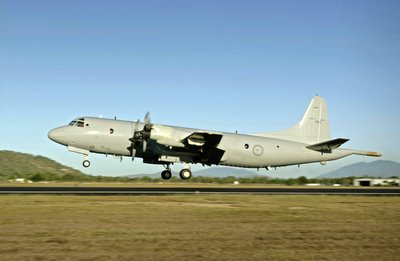
Reported here:
Indonesia has given guarded support to a plan for Australian navy patrol aircraft to help guard the strategic Malacca Straits against terrorist attacks and piracy.UPDATE: Some background on the issues involved with the littoral states here and at the links therein. Red splashes on map reflect previously reported pirate attacks.
Malaysian Deputy Prime Minister Dato Sri Mohd Najib discussed the plan with Foreign Minister Alexander Downer on Friday, asking if Canberra would consider sending long-range RAAF P-3C Orion patrol aircraft to help oversee the vital 1,000 kilometre waterway.
But reflecting diplomatic sensitivities in Jakarta and Kuala Lumpur about foreign intervention, Mr Downer said Australian aircraft would fly only with observers from one of the three neighbouring countries on board.
"They believe the littoral states should have primary responsibility, and certainly should have full responsibility for direct intervention, that is, on-the-water intervention," he said.
Suez canal terror attack alert

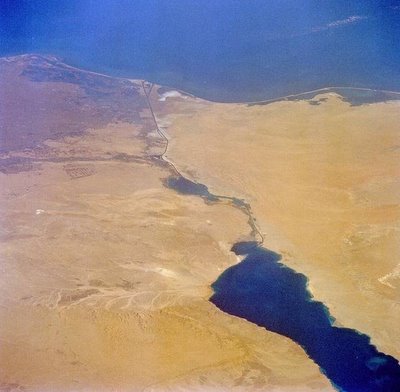
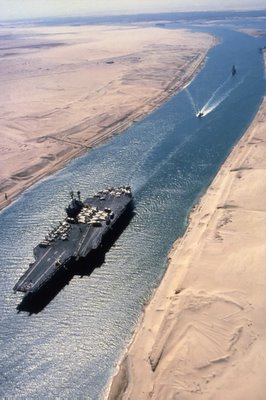
Egypt and Israel are responding to warnings of possible al-Qaeda terror attack along the Suez Canal as reported here:
Egypt put its installations along the Suez Canal on high alert over the weekend after receiving warnings of a possible terrorist attack by al-Qaida on ships in the strategic waterway.Effect of stopping or slowing shipping flow through the Suez Canal here by the US Energy Information Adminstration:
The alert coincidentally followed a report in The Jerusalem Post (NB Eagle1: see here) Friday that the Israeli Navy had decided to avoid the Suez Canal out of concern its vessels would be targets for Islamic Jihad terrorists.
Egyptian canal officials and security sources told news agencies that the warnings had come from Egypt's embassy in Denmark, but did not give details about how the embassy received the information.
Egyptian security forces barred fishermen from the waterway and closed some roads leading to the canal, especially in the area between Ismailia and the northern entrance of Port Said.
Security was beefed up along the patrol roads parallel to the canal that are used by security and other authorities, an official from the Suez Canal Authority told news agencies.
Shipping in the canal, which is a major international trade route running between the Mediterranean and Red Sea, has not been affected by the measures, one official said.
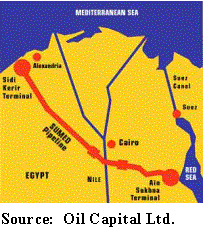
Oil Flows (2004E): 3.8 million bbl/d northbound, and 0.4 million bbl/d southbound. Northbound shipments consisted of 2.5 million bbl/d of crude oil via the Sumed Pipeline (nearly all of which came from Saudi Arabia), 0.8 million bbl/d of crude oil via the Suez Canal, and 0.5 million bbl/d of petroleum products via the Suez Canal. Southbound oil flows through the Suez Canal totaled 0.3 million bbl/d of petroleum products, and 0.1 million bbl/d of crude oil.UPDATE: You might recall the crude rocket attack from August 2005 here and here. Are the Jihadists plannning a large attack to coincide with the upcoming Iraqi elections so as to swamp media coverage of that important event? My guess is "Sure they are."
Destination of Sumed Oil Exports: Predominantly Europe; also United States.
Concerns/Background: Closure of the Suez Canal and/or Sumed Pipeline would divert tankers around the southern tip of Africa (the Cape of Good Hope), adding greatly to transit time and effectively tying up tanker capacity...
...In 2004, about 3,300 oil tankers passed through the Suez Canal, an almost 20 percent increase in tanker traffic from 2003 levels, when 2,800 tankers passed through the canal. Total (both northbound and southbound) oil shipments increased from 1.4 to 1.7 million bbl/d between 2003 and 2004. Oil historically has represented about 25 percent of Suez Canal revenues. Currently, the Suez Canal can accommodate Suezmax class tankers with drafts of up to 62 feet and 200,000-dead-weight-ton maximum cargos. In 2001, the Suez Canal Authority (SCA) launched a 5-year program to reduce tanker transit times (from 14 hours to 11 hours) through the Canal. The SCA also is moving ahead with a 10-year project to widen and deepened the Canal, so that by 2010 it can accommodate Very-Large-Crude-Carrier (VLCC) and Ultra-Large-Crude-Carrier (ULCC) class tankers with oil cargos of up to 350,000 dead-weight-tons.
Container security
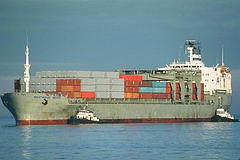
Nicely done piece on ports and shipping container security here:
Hampton Roads is what the maritime industry calls a "container port." Most of its international cargo travels in containers, sturdy corrugated steel boxes, 20 or 40 feet long and 9½ feet high, designed for easy transfer among ships, trains and trucks. They can be packed with an endless variety of goods, often loaded at different points by different parties.
Containers have been used to smuggle drugs, guns and money, and terrorists surely are probing for ways to use them to attack the U.S., Gabriel said. The most frequently cited scenario is the smuggling-in of a radiological "dirty bomb," a conventional bomb packed with radioactive material to contaminate the blast area.
Two months ago, a tip from overseas that bomb materials were being smuggled in a container to the Port of Baltimore prompted authorities to close tunnels in Baltimore for hours. The tip turned out to be the latest in a series of false alarms from Boston to Los Angeles.
Containers hide people, too. Shortly after the 9/11 attacks, Italian port authorities opened a container to find a young Egyptian man living inside, equipped with several weeks' supply of food and water, a toilet, a laptop computer and a satellite phone. He was en route to Canada.
Only six weeks ago, Gabriel said, several stowaways from Europe passed through Hampton Roads hidden in a container on a cargo ship. The stowaways were captured when the ship subsequently called on the port of Savannah, Ga., and they were deported.
In 2002, four Pakistani seamen jumped ship in Hampton Roads and vanished, leading to a congressional inquiry. Controlling who comes and goes from ports "is a problem, it's a vulnerability," Gabriel said. "We're working on it."
The U.S. strategy at Hampton Roads and other seaports is to identify and scrutinize high-risk cargo -- between 2 percent and 6 percent of the arriving containers -- and allow the vast majority of cargo to flow uninterrupted.
Even a brief interruption in that flow could shake the U.S. economy, because roughly 95 percent of the goods entering the country come through its ports.
 Photo - Port of Norfolk.
Photo - Port of Norfolk.
Saturday, December 10, 2005
Somali pirate fighter Top Cat - dubious reputation?
According to Strategy Page:
My initial reaction to her report was that it was interesting, but not necessarily relevant because my assumption has been that Top Cat's deal must have had some sort of approval before it was announced to the world, regardless of how Top Cat's business past looked (hey, if filing for bankruptcy makes you a crook, Donald Trump and a few airlines are in trouble). As is the case with all assumptions, I may have been way wrong.
For background, you might want to read this and the comments thereto.
If I learn more, I'll post it.
UPDATE: More on the "cease and desist" by Mountain Runner.
Top Cat Marine, the company the Somali government has hired to clean out the pirates along the coast, turned out to have a buccaneering background itself, including shady deals, bankruptcy, former South African mercenaries and other interesting touches. But the company has, on occasion, delivered. Whether it will here, and whether the Somali government can pay for the services, remains to be seen.Kathryn Cramer has been all over what she alleges is Top Cat's background. See here for her initial look at Top Cat. And here for her report that the Department of State has issued a "cease and desist" order to Top Cat.
My initial reaction to her report was that it was interesting, but not necessarily relevant because my assumption has been that Top Cat's deal must have had some sort of approval before it was announced to the world, regardless of how Top Cat's business past looked (hey, if filing for bankruptcy makes you a crook, Donald Trump and a few airlines are in trouble). As is the case with all assumptions, I may have been way wrong.
For background, you might want to read this and the comments thereto.
If I learn more, I'll post it.
UPDATE: More on the "cease and desist" by Mountain Runner.
World Cup 2006
Good news and bad news in the draws for the soccer World Cup 2006.
The US is in Group E with Italy, the Czechs and Ghana.
England has Parguay, Tinidad & Tobago, and Sweden.
Australia is in a tough group with Brazil, Croatia and Japan.
France gets the Swiss, South Korea and Togo.
Mexico is in a group with Iran, Angola and Portugal.
In Group E, Italy must be a heavy favorite. US starts with the Czech Republic on June 12 and plays Italy on June 17. Urk.
US odds 100/1. Australia125/1. Italy 8/1. Brazil is favored to win it all- 11/4 fav.
The US is in Group E with Italy, the Czechs and Ghana.
England has Parguay, Tinidad & Tobago, and Sweden.
Australia is in a tough group with Brazil, Croatia and Japan.
France gets the Swiss, South Korea and Togo.
Mexico is in a group with Iran, Angola and Portugal.
In Group E, Italy must be a heavy favorite. US starts with the Czech Republic on June 12 and plays Italy on June 17. Urk.
US odds 100/1. Australia125/1. Italy 8/1. Brazil is favored to win it all- 11/4 fav.
Singapore says terror groups looking for new targets
Reported here: 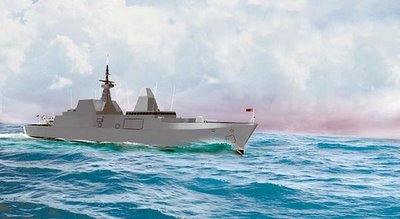
More on the Singapore frigate here and here.
Southeast Asian terrorist groups are seeking new targets and remain a serious threat to the region, Singapore's Home Affairs Minister Wong Kan Seng has warned.
"Indeed, notwithstanding our successes, we have clearly seen a certain resilience in the terror networks in the region to regenerate itself with new recruits," Wong said at the launching ceremony of a new frigate for the Singapore navy.
"While we may have seen fewer car bombs of late, we have seen more suicide bombers with body-borne bombs," he said.
Southeast Asia has been described by the United States as the second front in its global "war on terror". Jemaah Islamiyah (JI), an Al Qaeda-affiliated group, has been blamed for several attacks in the region, especially in Indonesia.

More on the Singapore frigate here and here.
Aboard the USS Firebolt in the NAG
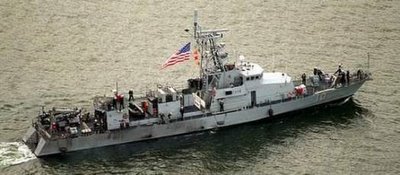
Nice article from the Virginian Pilot about the patrols off Iraq here:
...the most powerful weapon aboard the Firebolt is something that shows up on Christmas lists: an MP3 player.More on Firebolt here
The hand-held black box – essentially an up-armored iPod – attached to the deck plays digital recordings of about 100 simple nautical commands in several tongues.
It has proved a cheap, valuable weapon in a war where cultures and language collide, and where translators are in short supply when ships, friendly or otherwise, are encountered at sea.
The hand-held black box on the deck of the coastal patrol boat Firebolt is essentially a heavy duty, military-grade iPod.
“It’s a great tool, because the language barrier is pretty difficult to bridge,” said Lt. Marisa McClure, the ship’s commanding officer...
...The Firebolt and its 32-sailor crew, based at Little Creek Naval Amphibious Base, is part of a fleet of coalition ships patrolling the northern Persian Gulf around Iraq’s two major oil platforms...
Latest ONI World Wide Threat to Shipping (to 7 Dec 2005)
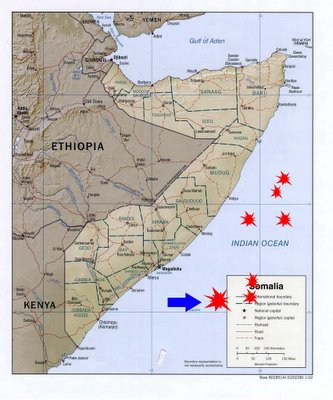
Go here and click on the date. Highlight:
1. SOMALIA: An unidentified tanker reported being chased 06 Dec while underway in position 12:01N, 050:35E. The vessel reportedMore on the tanker story here:
seeing individuals in speedboats armed with machine guns and other
weapons. The master contacted the owners and requested assistance
from Coalition naval vessels in the area. The tanker was proceeding
from Dubai to southern waters of Somalia to supply fuel to fishing
vessels in the area (IMB).
ship has narrowly escaped being hijacked by pirates in northern Somalia.
The vessel, mv Sirchai Petroleum II, was said to be on its way to deliver fuel to fishing vessels in southern Somalia on Monday morning.
Seafarers Assistance Programme (SAP) coordinator Andrew Mwangura told the Nation yesterday that he had been informed by the vessel owners that the attack occurred at 10am.
"Immediately the hijackers appeared, the master started speeding," he said.
The hijackers sprayed the ship with bullets, but the speed saved the ship and her 10-man crew, said Mr Mwangura.
No one was hurt, but the condition of the ship is not yet clear.
"The initial information was centred on the crew. We are still trying to find out the condition of the vessel," said Mr Mwangura.
The attack occurred near Haradhere, an area that appears to be under the total control of pirates.
There are also reports that a container vessel was hijacked on November 28.
PM Blair warned- Cruise ships and oil tankers terrorist targets

Says here:
URGENT action needs to be taken to stop al-Qaeda attacking cruise liners and oil tankers, Tony Blair has been warned.Let's see, where have we heard this before? Maybe here or here or here or here among other places.
Maritime security is the weak link in the defence against another 9/11-style outrage, says an international agreement on combating terror.
The document, agreed by the Prime Minister and more than 30 other world leaders, said more must be done to lessen the "serious" risk of an attack at sea.
The warning comes after pirates attacked luxury cruise liner Seabourn Spirit off the coast of Africa last month with guns and rockets.
Security sources fear the raid could inspire terrorists to launch a Christmas spectacular against a passenger ship causing mass casualties. A security source told the Mirror: "Al-Qaeda has the aim of targeting weak links in the global economy.
"Given most of the 80 million barrels of oil the world uses every day is transported by sea, shipping is a high-value, low-risk target." Experts have warned that cruise ships with up to 5,000 passengers could be sunk by a small number of terrorists.
And suicide assaults against oil tankers could be made using small speedboats packed with explosives.
Such an attack in the English Channel - the world's busiest shipping lane - would cause economic damage and be an environmental disaster.
Friday, December 09, 2005
Battleship controversy continues
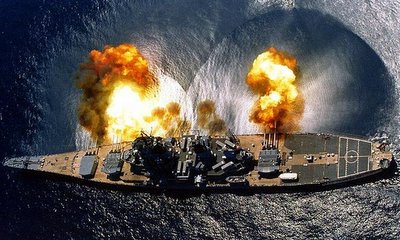
The drum beat for some sort of lingering battleship presence goes on, as seen in Marines fear scuttling battleships :
The Navy high command is determined to get rid of the battleships, relying for support on an expensive new destroyer at least 10 years in the future. This is how Washington works. Defense contractors, Pentagon bureaucrats, Congressional staffers and career-minded officers make this decision that may ultimately be paid for by Marine and Army infantrymen.As Shadow put it so well in a comment to an earlier post
Marine desire to reactivate the Iowa and Wisconsin runs counter to the DD(X) destroyer of the future. It will not be ready before 2015, costing between $4.7 billion and $7 billion. Keeping the battleships in reserve costs only $250,000 a year, with reactivation estimated at $500 million (taking six months to a year) and full modernization more than $1.5 billion (less than two years).
On the modernized battleships, 18 big (16-inch) guns could fire 460 projectiles in nine minutes and take out hardened targets in North Korea. In contrast, the DD(X) will fire only 70 long-range attack projectiles at $1 million a minute. The new destroyer will rely on conventional 155-millimeter rounds that Marines say cannot reach the shore. Former longtime National Security Council staffer William L. Stearman, now executive director of the U.S. Naval Fire Support Association, told me, "In short, this enormously expensive ship cannot fulfill its primary mission: provide naval surface fire support for the Marine Corps."
The battleships are gorgeous to look at, but we would have to rebuild the entire industrial infrastructure that created and supported them, so reviving them would be problematic. The spare gun tubes and liners were discarded in the late 1990s and we no longer have the capacity to build new replacements. The amunition is WWII vintage or older and would have to be refurbished. Most of the companies that built their systems are nearly forgotten, such as Studebaker (winch and hoist componants), or no longer build things of that sort. Manpower demands for the engineering plants are huge, controlled superheat 650 psi boilers require large watch and GQ teams, not to mention the fact that these systems have been out of the inventory for a long time (I served on a heavy cruiser of the same vintage and am painfully aware of these problems). It would simply be less expensive, in the long run, to build a new class of ship with greater flexibility and more modern systems. They were pretty (I've seen them at sea), but sadly, their day has passed.I'm not sure the DDX is the right ship, but then again, I'm not sure how much demand there is for Naval Gunfire SUpport missions, either.
Hat tip: Rapid Recon
Pirates and the price of fish in Nigeria

One more cost of having pirates roam your coast, as reported here:
Nigeria’s high spending on importation of fish yearly has been attributed partly to the activities of poachers and pirates on the country’s inshore water and economic zones.Might be good reason to spend some more money on your Coast Guard and Navy...
The National President of the Nigerian Trawler Owners Association, Engr. Sam Azebokhai, made this known in a chat with Agricbusiness in Lagos during the week.
According to him, the country has lost more than N600,000 million to pirate attacks on trawlers on their way to or from the fishing grounds.
“Pirate attacks on trawlers on their way to or from the fishing grounds have been on the increase in recent years. Lives, money, personal effects, catches and valuable equipment have been lost to these attacks. Piracy attacks of fishing vessels at sea has continued to-date. Between 1999 and 2005, many of our vessels had been attacked and lives lost in the hands of these bandits.”
Turkey-CIA Inquiry.
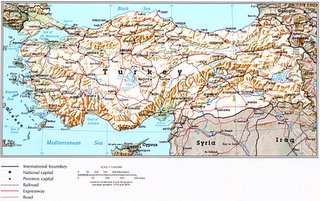
Noted here:
Turkey's main opposition party on Friday called for a parliamentary inquiry into alleged CIA activities following media reports that a plane operated by the U.S. intelligence agency landed in the country recently.
The government confirmed last week that a plane described in the reports landed in Turkey twice in the past two months, but could not say whether it was operated by the CIA.
The opposition Republican Peoples' Party submitted a petition requesting a parliamentary investigation, saying the allegations could harm the country's reputation.
The inquiry should look into allegations that CIA officials were 'involved in activities that go against international agreements under the guise of preventing terrorist activity,' the Republican Peoples' Party said...
...The call also follows allegations by the lawyer of a suspected al-Qaida militant who claimed his client was recently questioned by foreign agents inside an Istanbul prison where he is being held. The airport where the alleged CIA plane landed is close to the prison.
Earlier this month, the lawyer of Loa'i al-Saqa, a Syrian detained in August on suspicion of planning to ram a boatload of explosives into a cruise ship carrying Israeli tourists, claimed his client was illegally questioned by foreign agents, possibly working for the CIA.
Gasoline prices
The good people at Chart of the the Day have updated one of my favorites of their charts -gasoline prices adjusted for inflation. 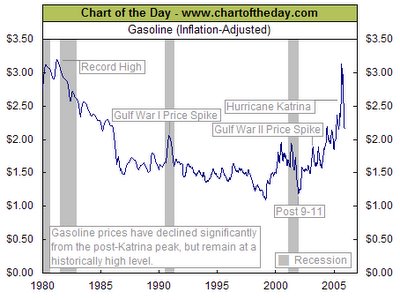
Despite all the Congressional flurry about refining foloowing Katrina, it will take some time before any of the much needed capacity of any new refineries may have an impact.
For a brief refresher on the logistics train involved in getting gasoline to your neighborhood, you might want to start here.

Despite all the Congressional flurry about refining foloowing Katrina, it will take some time before any of the much needed capacity of any new refineries may have an impact.
For a brief refresher on the logistics train involved in getting gasoline to your neighborhood, you might want to start here.

